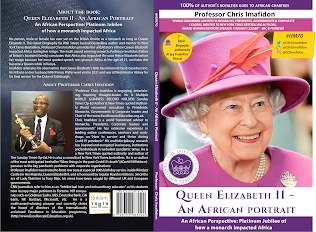
QUEEEN ELIZABETH II … first anniversary
On September 8th, 2022, Queen Elizabeth II, the longest-reigning monarch in British history, passed away at the age of 96. Her death marked the end of an era and left a void in the hearts of millions of people around the world. Queen Elizabeth II was not just a British monarch; she was a mother figure who cared deeply about the education, inner-city youths, and the development of the next generation in every corner of the Commonwealth and the world.
Her unparalleled contributions, initiatives, and charitable service to education and youths of inner cities not only in England or the UK but in distant African Commonwealth countries deserve to be recognized with a public holiday named after her. Queen Elizabeth II’s impact and legacy are felt in the capital cities of Africa and rural areas of the developing world. She was a symbol of stability in an era of sweeping social and political change.
During her seven decades on the throne, the British Empire was dismantled, and the UK’s role in the world shrank dramatically. Growing pressure for independence in Scotland and arguments for Irish unification threatened to redraw the UK’s own borders, and ruptures within her family raised questions about the monarchy’s future role. However, Queen Elizabeth II remained a constant presence and a source of inspiration for millions of people around the world. Her dedication to education and youth development was unparalleled. She believed that every child, regardless of their background, deserved access to quality education and the opportunity to reach their full potential. Her initiatives, such as the Duke of Edinburgh Award, helped millions of young people develop their skills, confidence, and resilience.
In the best-selling royal biography by world-renowned Professor Chris Imafidon, he states, “Queen Elizabeth II was more than just a British monarch; she was a real mother who cared about the education, inner-city youths, and the development of the next generation in every corner of the Commonwealth and the world.” Her legacy is felt in the countless schools, colleges, and universities that bear her name, and in the millions of young people who have benefited from her initiatives.
Therefore, it is only fitting that we honour her legacy with at least a public holiday named after her. This holiday would not only recognize her unparalleled contributions to education and youth development but also serve as a reminder of the values that she embodied. These values include dedication, service, and a commitment to excellence. They are the same values that we should strive to uphold in our own lives and in our communities.
Moreover, a public holiday named after Queen Elizabeth II would be a fitting tribute to her legacy and a celebration of her life. It would provide an opportunity for people around the world to come together and reflect on her contributions to education and youth development. It would also serve as a reminder of the important role that education plays in shaping the future of our world.
Queen Elizabeth II was a rare leadership gem who left an indelible mark on many aspects of life. Her contributions, initiatives, and charitable service to education and youth development have been widely recognized. However, her impact and legacy extend far beyond these areas. Here are some of the other aspects of life where the late Queen Elizabeth II left an indelible mark:
- Leadership and Service
Queen Elizabeth II was a leader who was incomparably devoted to her service and her people
She was the historic figurehead of modern times and a female leader who inspired many. Her reign lasted from the industrial age to the internet age, and she met generations of legendary, mostly male, global leaders and helped steer Britain through the loss of its empire and its emergence as a midsized multicultural nation. . Her cool, reliable cheerfulness made her overwhelmingly popular with the British public.
- Diplomacy and International Relations
Queen Elizabeth II was a skilled diplomat who played a key role in shaping international relations. She was the head of state for 15 countries, including Jamaica, and the leader of 40 other Commonwealth members . She met with numerous world leaders during her reign, including former UK prime ministers, Commonwealth leaders, and US presidents. Her diplomatic skills helped to strengthen the UK’s relationships with other countries and promote peace and stability around the world.
- Modernization and Innovation
Queen Elizabeth II oversaw many transformations during her reign, from the dismantling of the British Empire to the emergence of the internet age. She was a modernizing force who embraced innovation and change. For example, she was the first British monarch to send an email in 1976. She also embraced social media and launched her own Instagram account in 2019.
- Cultural and Artistic Patronage
Queen Elizabeth II was a patron of the arts and a champion of cultural heritage. She was a keen supporter of the Royal Ballet, the Royal Opera House, and the National Theatre. She also had a passion for art and was a patron of the Royal Academy of Arts. Her patronage helped to promote the arts and culture in the UK and around the world.
- Humanitarianism and Philanthropy
Queen Elizabeth II was a humanitarian who cared deeply about the welfare of others. She was involved in numerous charitable organizations and initiatives, including the Queen’s Trust, which supports young people in the UK, and the Queen Elizabeth Diamond Jubilee Trust, which supports initiatives to improve the lives of people in Commonwealth countries. Her philanthropic work has had a lasting impact on many people’s lives. To celebrate or immortalize Queen Elizabeth II’s legacy for future generations, here are some suggestions:
- Create a public holiday named after her to recognize her unparalleled contributions to education, youth development, leadership, diplomacy, modernization, innovation, cultural and artistic patronage, humanitarianism, and philanthropy.
- Establish a scholarship or fellowship program in her name to support young people who are pursuing careers in these areas.
- Build a museum or cultural centre dedicated to her life and legacy, showcasing her contributions to the UK and the world.
- Commission a statue or monument in her honour, to be placed in a prominent location in the UK or in other countries where she had a significant impact.
- Create a national day of service in her honour, encouraging people to volunteer and give back to their communities in the spirit of her humanitarianism and philanthropy.
In conclusion, Queen Elizabeth II was a rare leadership gem who left an indelible mark on many aspects of life. Her contributions, initiatives, and charitable service to education and youth development have been widely recognized, but her impact and legacy extend far beyond these areas. To celebrate or immortalize her legacy for future generations, we should recognize her contributions to leadership, diplomacy, modernization, innovation, cultural and artistic patronage, humanitarianism, and philanthropy.
Professor Chris Imafidon, is an award winning chair of HM Queen Elizabeth’s Platinum Jubilee programme on STEM & Education. He recently chaired the Coronation series on Artificial Intelligence’s impact on education and has authored royal biographies. He is multi-Guinness World record holder; Internationally renowned adviser to monarchs, governments, presidents and corporate leaders; Mentor to multi-millionaire tech entrepreneurs, Coach to New York Times Bestellers and a Sunday Times Op-ed author. He is a 5X International bestselling author, Wall Street Journal bestselling author, and a celebrated royal biographer. His research and innovation have been recognized internationally, winning multiple awards in many continents across multiple disciplines and his mentees are global leaders in pioneers and also world record holders. [Twitter @ChrisImafidon; Instagram @CoImafidon











